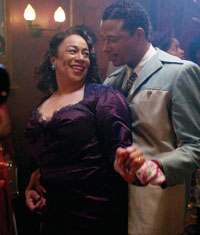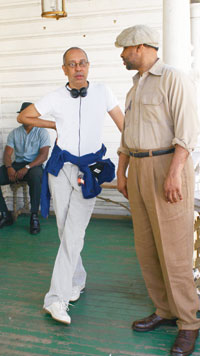DOWN & OUT IN UPSTATE NEW YORK
George C. Wolfe makes his directorial debut by recapturing a lost world in Lackawanna Blues.
BY IRA SACHS
Director George C. Wolfe. PHOTO: MICHAEL LAVINE.
With Lackawanna Blues, veteran theater director George C. Wolfe (Angels in America, Jelly’s Last Jam, Topdog/Underdog) has turned to film and made a muscular musical celebration of and elegy for a nearly lost piece of African-American life. Adapted by Ruben Santiago-Hudson from his own autobiographical one-man play and produced by HBO Films, Lackawanna Blues is dominated by a central performance by Law & Order regular S. Epatha Merkerson as Nanny, the larger-than-life proprietor of an upstate New York boarding house in the 1950s and ’60s.
The film premieres at the Sundance Film Festival, after which it will play on HBO throughout February. Filmmaker Ira Sachs talked with Wolfe about Lackawanna Blues in his offices at the New York Public Theater, where Wolfe recently stepped down after a decade-long stint as the theater’s artistic director.
FILMMAKER: Congratulations on your first foray into film.
GEORGE C. WOLFE: Thank you.
FILMMAKER: When I got to the end of the film, I suddenly found myself crying, which was completely unexpected, I have to say.
WOLFE: Good!
FILMMAKER: As I was watching the film, I didn’t really know where it was going, so I didn’t know what you were trying to build to. But by the time I got there, I understood.
WOLFE: Well, it could have been just a story about a woman and boy, which is a full story. What I really wanted to get to was that Nanny’s death is the death of that community — her death is [also] the death of a way of life.
FILMMAKER: Do you think anything has replaced that way of life?
 |
| S. Epatha Merkerson and Terrence Dashon Howard in Lackawanna Blues. PHOTOS: BOB GREENE/HBO. |
FILMMAKER: Maybe the world of the theater is what has replaced that world for you and for Ruben?
WOLFE: I think if you’ve ever been a part of a community, it builds inside of you the need to create your own. So yeah, definitely, the theater’s been that for me. But to tell you the truth, this film, in a strange way, is a kind of love poem to segregation — you know what I mean? I think that the definition of community, at least in the way that Nanny practices it, is “those who are not invited to that party over there.” [This idea of community] includes Laura, the white woman who is married to this black man. It includes the Latin people and these crazy people. I mean, she clearly is a woman of color and she clearly defines herself as a woman of race, but I think her definition of world and community and home is larger than that.
FILMMAKER: The film ends with images of empty streets and abandoned buildings.
WOLFE: Which is Lackawanna.
FILMMAKER: The actual place, Lackawanna?
WOLFE: Yeah.
|
WOLFE: It was something that I always wanted, but originally we were going to create almost like a matte-painting kind of thing and use digital effects of Ruben walking out the door. He looks around and sees this devastated community. But art doesn’t let you do something that it doesn’t want to do; it just doesn’t. First I had trouble communicating [the idea] with the guy who was going to do it, so much so that it was like, “Oh, this is not going to work.” Then somebody [came in to try] to communicate with the guy because he and I were not connecting. Then we were going to find another person. It was all this kind of stuff. And every single thing about the process was screaming, “This is a wrong idea, this is a wrong idea!” Then at one point it became clear that the movie — the whole movie, the way it was colored and the way it dances, the way it’s edited — the movie itself is some big, giant, living matte painting. It’s one big giant special effect. So when Ruben walked out of the door, that [exterior] couldn’t be fake; it had to be real. Memory affords us a chance to paint the world as we want to paint it, but then reality is very different. And the reality is that there’s not much left of Lackawanna.
FILMMAKER: It seems like editing was an important tool in creating that heightened sense of Nanny’s world. The cutting is very quick, highly paced, and it’s not always linear.
WOLFE: Editing on one level became for me like the rehearsal process in theater but without the actors present. In the editing room, what you’re doing is building the dynamics of a performance like you would over a five- or six-week time period in rehearsal. But also, editing felt like what I do in theater, which is, I turn into a creature of rhythm. And rhythm becomes the way that you get an audience to surrender. You pull them in, you let them take a pause, you take them someplace they don’t necessarily know that they’re going, and then [he claps] smash them there. I didn’t want [the film] to ever live in the realm of nostalgia. I wanted to be so visceral that you are literally in the movie. You are never witnessing the movie, but instead you are inside its rhythm.
FILMMAKER: Nanny seems like the mirror opposite of the character of Caroline Thibodeaux [Wolfe directed both the Public Theater and Broadway productions of Tony Kushner’s play Caroline, or Change].
WOLFE: Oh, completely and totally.
FILMMAKER: Caroline is all anger, while Nanny is more like all love.
 |
| George C. Wolfe on the set of Lackawanna Blues. |
FILMMAKER: You sound like you’re describing yourself.
WOLFE: Probably.
FILMMAKER: Directing, and running a place like the Public.
WOLFE: Oh, absolutely. At one point when I first took this job, I was like, “Oh my God, how the hell am I going to do it?” I did it, but at one point I woke up and learned my kidney wasn’t working, and I had to get my blood cleaned out. I also saw my mother, a school principal who would do all this other sort of stuff, and [she] had a series of heart attacks. I [thought], Oh, it’s really great when somebody clicks into that sense of service, but what are the consequences? The consequences are that there’s a huge loss to be paid. It’s interesting — when I would be talking to Epatha, I’d often have very specific images of my mother going through a series of heart attacks and a stroke until finally her body was rendered immobile. But for Caroline, something that she should have gotten very early on, she didn’t. When violation happens, she turns it in on herself. It lives there for a very long time, so that when it finally releases itself it’s out of proportion to the initial violation.
FILMMAKER: Well, you could say that the initial violation was racism in America, which is a pretty big.
|
FILMMAKER: Do you find one representation more realistic than the other?
WOLFE: I think it’s just different. I think the “this will never happen again” is very much like the women on my mother’s side of the family, and it’s that kind of spirit and energy I find really fascinating. I also think that there’s something very interesting about people who are in the process of claiming their power. They very frequently need someone to violate them before they realize that they have the right to assert their personality. It’s a complicated process.
FILMMAKER: To direct a film, to wake up every day and do something you hadn’t done before? It must have been a steep learning curve.
WOLFE: Absolutely.
FILMMAKER: You have to be both dictator as well as —
WOLFE: Never a dictator!
FILMMAKER: A benevolent dictator?
WOLFE: A highly insistent, generous human being who knows exactly what he wants and has the right to do it.
FILMMAKER: You sound like Nanny.
WOLFE: I am [laughs]. It was peculiar because there was a vulnerability, but I think that vulnerability ended up [allowing] me to hit the ground running because I didn’t know how much I knew about what I wanted. You know what I mean? I was arrogant enough and clueless enough to view the process my way. I didn’t try to pretend to be this other kind of filmmaker. I was my kind of filmmaker.
FILMMAKER: And how would you describe your kind of filmmaker?
WOLFE: Well, I don’t know. [laughs] In theater I always tried to stage things filmically. And on film, I wanted to try to see how much theatricality I could sneak in without people going, “Theater director, theater director!” I wanted to try to push things as much as I possibly could in a certain direction just to see where the power would live. There are certain films and filmmakers I love for either the way their language cascades or because of their theatricality. Like I love Citizen Kane because you can tell that’s a theater director who did that, and it’s completely and totally a film, and unbelievably theatrical in a way that I find really thrilling. I love Altman — I love Nashville — for many of the same reasons.
FILMMAKER: How do you feel now that the film is going out into the world?
WOLFE: To tell you the truth, I work on a project and then when it’s done, I don’t really feel any ownership. I feel like it’s its own thing, that it’s a really beautiful child, really smart and really dazzling. I look at it as a thing separate from me. The next thing, whatever it’s gonna be, I don’t have any idea what the hell I’m doing. So all my insecurities…
FILMMAKER: Go into the next thing.
WOLFE: They go into the next thing, so thereby I can start the process again.
FILMMAKER: Do you want to continue working in film?
WOLFE: Yeah, I had a lot of fun, and I think I really got something from it. Like that second day I literally went, “Oh shit, I like this.” I felt like, “Oh God, here comes a new addiction.”
VOD CALENDAR


 See the VOD Calendar →
See the VOD Calendar →



